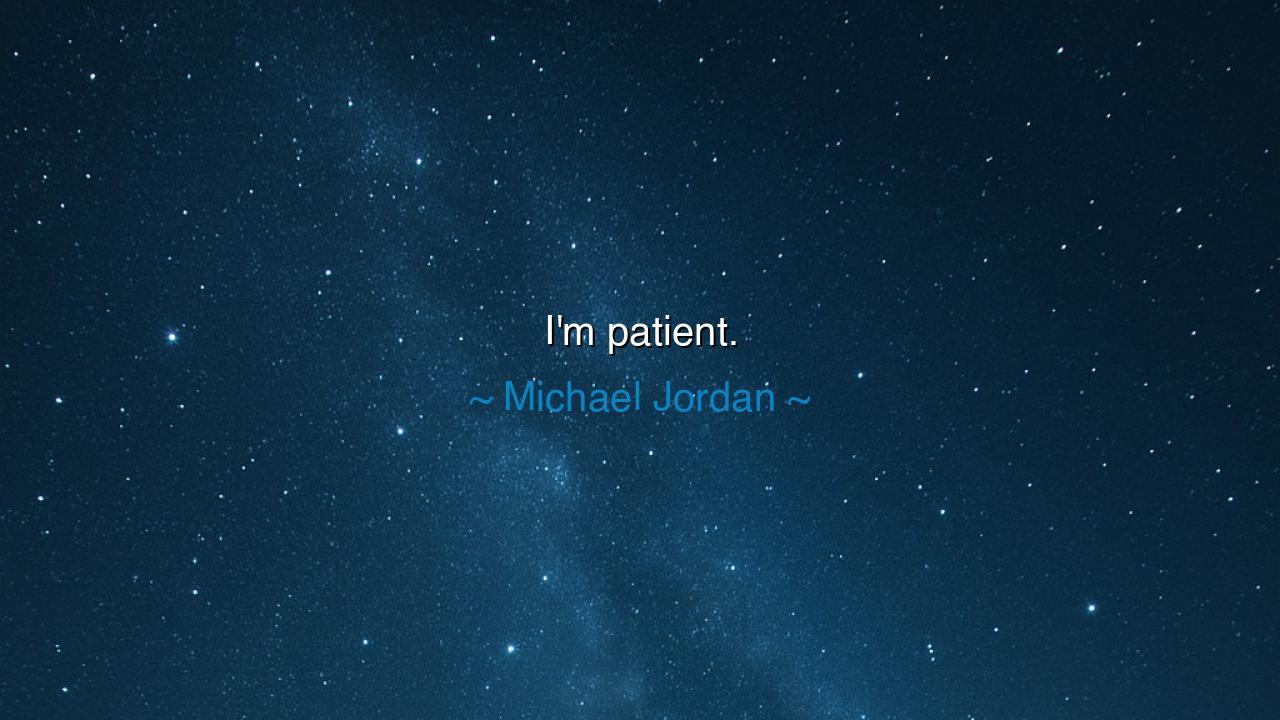
I'm patient.






The words of Michael Jordan—“I’m patient”—are deceptively simple, yet they carry the weight of a lifetime of struggle, triumph, and relentless discipline. Spoken by one often hailed as the greatest to ever play the game of basketball, they are not merely a casual remark, but a revelation of character. For patience is not weakness, nor is it passivity. It is the quiet strength that waits for the right moment, that endures failure without surrender, that persists when others quit. In Jordan’s mouth, these words become a lesson in mastery: greatness is not seized in a single leap, but built, patiently, brick by brick.
The origin of this truth can be traced back to Jordan’s own story. He was not born a champion. As a teenager, he was cut from his high school varsity basketball team. In that moment, lesser spirits would have yielded to despair. But Jordan chose the long road of patience—hours in the gym, nights of practice, years of repetition. He understood that skill, like a tree, does not bear fruit instantly. It grows slowly, watered by effort, nurtured by discipline, guarded by patience. His later triumphs—the championships, the glory, the immortal name—were the harvest of this unseen waiting.
Consider too the wisdom of the ancients, for Jordan’s words echo them. The farmer sows seeds in spring and does not demand fruit that same day. The soldier trains for years before standing in battle. The sculptor chips slowly at marble, day after day, until the hidden figure emerges. Jordan’s declaration, “I’m patient,” joins this lineage. He knew that success comes not to the one who burns brightest in a moment, but to the one who endures the long trial without losing heart. Patience is the fire that does not fade.
His career itself was a testament to this. When he returned from his first retirement, his body was no longer the same, his rhythm unsteady. Many doubted him. But Jordan, with patience, rebuilt his strength, adjusted his game, and rose once more to conquer. Patience allowed him to transform, to endure the criticism, to wait for the moment when his will and skill would align again. Without this virtue, even the greatest talent would have withered in the face of time.
And here lies the paradox: Jordan’s style on the court was fierce, explosive, relentless. Yet behind that intensity stood a foundation of calm endurance. His greatness was not in impatience but in knowing when to wait, when to prepare, when to let the long years of training bring forth their fruit. Thus, when he declared, “I’m patient,” he was not boasting of a passive virtue, but of an active discipline, forged through suffering, defeat, and relentless perseverance.
The lesson for us is profound: if even the greatest relies on patience, how much more must we? When our goals feel distant, when our efforts seem unrewarded, when obstacles rise like walls before us, we must remember that nothing of value blooms in haste. Patience is the soil in which greatness grows. To abandon it is to uproot your dreams before they bear fruit. To embrace it is to walk the same path as the champions, the sages, the builders of history.
In practice, this means embracing the long road. Do not despise small beginnings. Work daily, even when progress seems invisible. Trust the process, as Jordan did, knowing that time is an ally to the diligent. When setbacks come, do not curse them; endure them, learn from them, let them refine you. For patience is not waiting in silence—it is continuing in faith, knowing that the seed you have planted will one day break the soil.
So let Jordan’s words echo within you: “I’m patient.” In their simplicity lies a secret: the path to greatness is not only talent, not only effort, but endurance. Be patient with your failures, patient with your growth, patient with the slow unfolding of your destiny. For in patience, dreams ripen, victories emerge, and the ordinary is transformed into the extraordinary.






AAdministratorAdministrator
Welcome, honored guests. Please leave a comment, we will respond soon